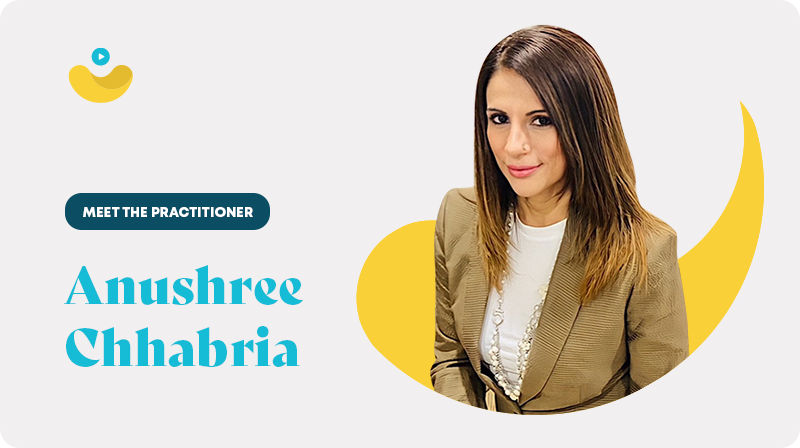Anushree Chhabria runs her own online counseling practice, Think Out Loud. She holds a law degree from The Hull University in England, specializing in Family Law Counseling, and studied child and adolescent psychology at The Chicago School of Professional Psychology. She is a member of the American Psychological Association, The Law Society of England and Wales, and The Bar Council of Maharashtra and Goa. Anushree conducts virtual sessions with clients in both the U.S. and India, and Healplace is proud to enable her to do that on one, integrated platform.

Q: How does your legal background inform your counseling?
A: My legal work involved preparing clients for trial. I had to be solution-focused. It’s the same with the people I counsel. They want and need to get to a better place. Throughout the process, I focus on that solution. Legal work also involves preserving client confidentiality. That’s just as important with my counseling clients. It’s about making clients feel that they are in a safe space. Lastly, both law and counseling involve active listening. That skill is how I develop the formal therapeutic bond.
Q: Your young clients range from adolescence to late teens. What are the key strategies and tools you use in counseling children?
A: First, trust. I build that through empathy and communication. I’m extremely empathetic. Not necessarily sympathetic, but empathetic toward their emotional needs. Children are also sensitive about preconceived notions or being judged. You can’t go to them with a notion of “right” and “wrong.” They’ll shut down. I suspend the judgment we all carry around: That’s good, this is bad.
When you’re positive and don’t judge, they will eventually open up and listen to you. I tell them it’s okay and normal to have their feelings, but I give them healthier ways of coping. I closely gauge their emotional quotient—that’s where active listening comes in. I had a young client tell me, “I just want you to listen to me.” That’s the key; they want to be heard.
Q: What are the major challenges in working with these kids?
A: They are going to resist you. There’s no point looking for logic from a child when they aren’t ready to listen. So it’s literally like they’re throwing a tantrum and you’re supporting them. But you have boundaries. I’ve had sessions where a child is getting aggressive or nasty toward me. Sometimes, the best thing you can do is take a break. “Let’s take a week off and when you’ve had a chance to reflect ….” Giving them time and space to reflect is important. They begin to understand that they need to regulate their emotions. They come to realize I can help them with that.
Q: Is managing the parents a part of the process as well?
A: Of course. Parents are defensive, and they are usually worried that anyone might think their child’s problem is the parent’s fault. Especially if the child has any form of a disorder, like autism, parents don’t want to accept that their child is “different.” So just explaining to the parent that it is not personal to them. It is something their child is going through. They need to listen and communicate. Communication is so essential, and most parental communications are based on assumptions. The parent says, “But I mean well.” No, you don’t mean well. If you mean well, you’ll talk to your child openly and with trust. Trust means suspending judgment. A parent is always judging, but a child in crisis is already feeling bad about themselves. The natural urge for parents is to tell the child what to do and not to do. But children don’t want to be “told”; they desperately want to be “heard.”
Q: How does working with Indian children differ from working with your American clients?
A: Indian culture still has strictly defined roles. The father goes to work and spends a little time with the children. The mother is usually responsible for the kitchen and primary caretaking. Most families have this sort of “old roles” structure. In America, the responsibilities are spread more evenly. It’s independent living, whereas India is dependent living. Indian children live with their parents, often even after they get married. It’s an obligation for Indian children to look after their aging parents. So, Indian families feel like there is a lot of support, but also rigidity and responsibilities. American families are more independent, but often less supportive. The culture is also different. For example, I have a twelve-year-old American client who wants to talk about sex. My Indian clients are like, “Can we even say that word?” So, yes, there are vast differences.
Q: Do you sometimes wish social media would just go away?
A: Oh absolutely. I wish and pray. I don’t think social media companies even fathom how much of what they’re doing is leading to mental health problems. Initially, it was just socializing, people getting together online. But the companies did not consider or anticipate how radically their websites would impact children. For children, social media often leads to poor self-esteem, and a lot of self-doubt. Children are already constantly worried if they are liked. Now, they second-guess whatever they post. If they don’t get enough likes, they feel like they are not good enough. If someone makes a personal, negative comment it can devastate a child. I have discovered children harming themselves because of what happen on these public platforms. It can take just one misguided person to take a child down. And that negativity can easily go viral. That’s not healthy for adults, and especially not for children.
Q: What does “Heal” mean to you?
A: Love. It means loving yourself unconditionally. When you accept who you are, love who you are, you have the adaptability to interact with others. The most important relationship you have is with yourself, and healing begins from within. Words like love, esteem, value … they don’t mean as much without “self” in front of them.
Show some love if you liked this post!







